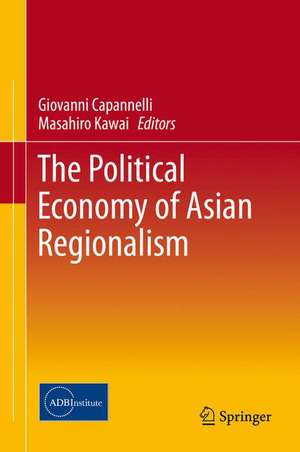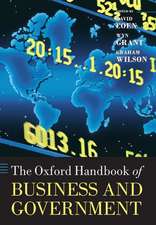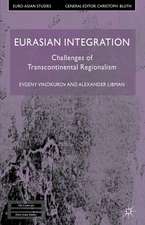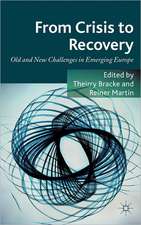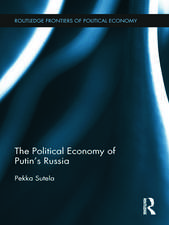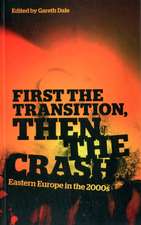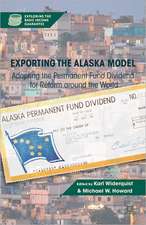The Political Economy of Asian Regionalism
Editat de Giovanni Capannelli, Masahiro Kawaien Limba Engleză Hardback – 4 feb 2014
| Toate formatele și edițiile | Preț | Express |
|---|---|---|
| Paperback (1) | 940.57 lei 6-8 săpt. | |
| Springer – 22 aug 2016 | 940.57 lei 6-8 săpt. | |
| Hardback (1) | 946.55 lei 6-8 săpt. | |
| Springer – 4 feb 2014 | 946.55 lei 6-8 săpt. |
Preț: 946.55 lei
Preț vechi: 1154.34 lei
-18% Nou
Puncte Express: 1420
Preț estimativ în valută:
181.15€ • 188.42$ • 149.55£
181.15€ • 188.42$ • 149.55£
Carte tipărită la comandă
Livrare economică 14-28 aprilie
Preluare comenzi: 021 569.72.76
Specificații
ISBN-13: 9784431545675
ISBN-10: 4431545670
Pagini: 209
Ilustrații: XVI, 193 p. 7 illus., 3 illus. in color.
Dimensiuni: 155 x 235 x 20 mm
Greutate: 0.48 kg
Ediția:2014
Editura: Springer
Colecția Springer
Locul publicării:Tokyo, Japan
ISBN-10: 4431545670
Pagini: 209
Ilustrații: XVI, 193 p. 7 illus., 3 illus. in color.
Dimensiuni: 155 x 235 x 20 mm
Greutate: 0.48 kg
Ediția:2014
Editura: Springer
Colecția Springer
Locul publicării:Tokyo, Japan
Public țintă
ResearchCuprins
Chapter 1. The Political Economy of Asian Regionalism: Issues and Challenges (Giovanni Capannelli and Masahiro Kawai).- Chapter 2. Foundations of Collective Action in Asia: Theory and Practice of Regional Cooperation (Amitav Acharya).- Chapter 3. Asian Regionalism after the Global Financial Crisis (Gregory Chin).- Chapter 4. Managing Asia’s Free Trade Agreements (Shujiro Urata).- Chapter 5. Regional Financial Architecture beyond the Global Financial Crisis (Soyoung Kim and Doo Yong Yang).- Chapter 6. Promoting Domestic Reforms through Regionalism (Philippa Dee and Anne McNaughton).- Chapter 7. Institutions for Asian Integration: Innovation and Reform (Giovanni Capannelli and See Seng Tan).- Chapter 8. Toward an Asian Economic Community? (Nagesh Kumar).
Notă biografică
Editors
Masahiro Kawai is the Asian Development Bank Institute’s dean and CEO. He was previously special advisor to the Asian Development Bank president in charge of regional economic cooperation and integration. Before that he was in academia, first as an associate professor of economics at The Johns Hopkins University and later as a professor of economics at the University of Tokyo. He also served as chief economist for the World Bank’s East Asia and the Pacific region and as deputy vice minister for international affairs of Japan’s Ministry of Finance. His publications focus on economic regionalism. He holds a BA in economics from the University of Tokyo and a PhD in economics from Stanford University.
Giovanni Capannelli is special adviser to the dean at the Asian Development Bank Institute. He was previously principal economist at the Asian Development Bank Institute and in the Asian Development Bank’s office of regional economic integration. His research work focuses on Asian economic development and regional integration. Prior to joining the Asian Development Bank in 2002, he was a faculty member of the Asia–Europe Institute, University of Malaya, and worked for the Tokyo delegation of the Bank of Italy. He is an economics graduate of Bocconi University, Milan, and holds a master’s degree and PhD in economics from Hitotsubashi University, Tokyo.
Masahiro Kawai is the Asian Development Bank Institute’s dean and CEO. He was previously special advisor to the Asian Development Bank president in charge of regional economic cooperation and integration. Before that he was in academia, first as an associate professor of economics at The Johns Hopkins University and later as a professor of economics at the University of Tokyo. He also served as chief economist for the World Bank’s East Asia and the Pacific region and as deputy vice minister for international affairs of Japan’s Ministry of Finance. His publications focus on economic regionalism. He holds a BA in economics from the University of Tokyo and a PhD in economics from Stanford University.
Giovanni Capannelli is special adviser to the dean at the Asian Development Bank Institute. He was previously principal economist at the Asian Development Bank Institute and in the Asian Development Bank’s office of regional economic integration. His research work focuses on Asian economic development and regional integration. Prior to joining the Asian Development Bank in 2002, he was a faculty member of the Asia–Europe Institute, University of Malaya, and worked for the Tokyo delegation of the Bank of Italy. He is an economics graduate of Bocconi University, Milan, and holds a master’s degree and PhD in economics from Hitotsubashi University, Tokyo.
Textul de pe ultima copertă
This book contributes to the theoretical and empirical literature on Asian regionalism, with a focus on the innovations needed to reform the current institutional architecture in Asia. After reviewing the key issues and challenges related to the political economy of Asia’s economic cooperation and integration, the book discusses various aspects of regionalism from political and economic perspectives. It looks at the rationale for regional collective action and reviews the trend of economic integration with a focus on the implications of the global financial crisis. In addition to reviewing the key issues related to the development of regional institutions for integration, the book analyzes issues such as trade and finance and deals with the implications of regionalism in terms of the introduction of domestic reforms in Asian countries before discussing the possible formation of a region-wide economic community. The eight chapters of the book are based on respective papers initially prepared for the Asian Development Bank Institute Conference 2010.
Caracteristici
Presents new ideas and perspectives on the creation of an Asian economic community
Discusses key issues of the reforms and innovations needed in the current institutional architecture to promote further economic integration
Written by well-known experts in the field of Asian economic integration and cooperation
Includes supplementary material: sn.pub/extras
Discusses key issues of the reforms and innovations needed in the current institutional architecture to promote further economic integration
Written by well-known experts in the field of Asian economic integration and cooperation
Includes supplementary material: sn.pub/extras
